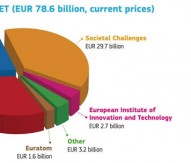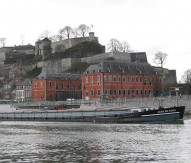

Irish Senate © Tommy Kavanagh
40 years in the making: Innovating Ireland
The year 2013 marks the 40th anniversary of Ireland’s accession to the EU. The country joined what was then European Economic Community with the United Kingdom and Denmark and has benefited significantly from European trade and investment, leading to a transformation of the country’s economy.
Máire Geoghegan-Quinn, the European Commissioner from Ireland, addressed senators at the Irish Parliament in the capital Dublin and reflected on the achievements of the member state and its transformation into a ‘Celtic Tiger’: “Research, innovation and science are the best tools and resources at our disposal to create the growth and jobs that are the priority of the Irish Presidency and of all the European Union’s decision makers.
“In 1973, we exported mainly agricultural products, now we export electronics, pharmaceuticals and services. When Ireland joined, its GDP per capita was two-thirds of the EU average. It is now one quarter above the average. European programmes have played their part in that transformation,” the Commissioner added.
“Ireland is a net beneficiary from structural, regional, cohesion and CAP funding. Since 1993, the European Social Fund has invested nearly €4bn in training and employment. Since 2007 alone, Irish universities, research organisations, companies and SMEs have received €484m from FP7 and they are on course to draw down a total of over €600m by the time the programme finishes at the end of this year. I have no doubt that the senators from the National University of Ireland and Trinity College Dublin can testify to the benefits of participating in the Research Framework Programmes.”
The digital communications revolution has played a key role in transforming Ireland’s economy. According to the Geoghegan-Quinn, Ireland now sits “at the heart of Europe’s digital and information and communication technology industries”; she also highlighted the importance of collaboration in research and innovation to the ‘Emerald Isle’.
“According to the industry association called ICT Ireland, nine of the top ten global companies maintain a presence in Ireland. This is testimony to how well Ireland has captured foreign direct investment in the ICT and other sectors. However, there is also a robust and successful home-grown ICT sector, built on the research base of Irish universities, companies and research institutes.
“R&D and innovation are essential to maintain this strength in ICT and grow even further. However, for this small country, it is not easy to achieve the necessary critical mass in research. Collaborating in EU-funded research and innovation can help plug any gaps in knowledge, resources or infrastructure. The inflow of European investment has certainly helped Ireland.”
Heart
Innovation has been placed at the heart of the EU’s seven-year Europe 2020 strategy and will be realised through several initiatives, including the development of a single European Research Area. It’s hoped this will encourage greater levels of innovation across different sectors and business sizes.
Commissioner Geoghegan-Quinn advised: “The Innovation Union aims to improve the basic conditions that will let companies grow and entrepreneurs flourish. An environment in which business large and small can prosper is essential to achieving the smart, sustainable and inclusive growth that Europe desperately needs. Therefore, we are concentrating on establishing the conditions that will smooth the path from lab to market and lead to new products and services that people around the world want to buy.
“We are making excellent progress on the 34 different commitments contained in Innovation Union. Our innovators and businesses needed a more affordable and less unwieldy, less costly patent system, so we established the Unitary Patent. SMEs and start-ups needed better access to finance, so we have created the European Passport venture capital fund to ease the availability of funding opportunities across Europe,” she outlined.
“To give innovative companies a chance and get better value from public budgets, we have modernised public procurement rules to encourage the take-up of innovative products and services. One of Innovation Union’s biggest commitments is to achieve the ERA. Think of the ERA as a European Single Market for research, knowledge and ideas. It aims to spread excellence by encouraging cross-border collaboration and open innovation.
“The ERA initiative sets out a series of measures to enable researchers, research institutions and businesses to better move, compete and co-operate across borders. In practice, this means removing career and practical barriers to the free movement of researchers across national borders. It means reducing fragmentation and duplication in our national research systems. It also means a number of reforms in third-level education. The Commission has called on academia and business to improve linkages and develop more strategic partnerships, to define collaborative research agendas and optimise the use of research results,” Geoghegan-Quinn added.
Witness
The realisation of the Innovation Union will also be witnessed through Horizon 2020 and Geoghegan-Quinn hopes it will fundamentally reform the way research and innovation is funded in the EU, whilst also supporting Europe’s economic recovery, the creation of new jobs and development of Europe’s knowledge economy.
“While Horizon 2020 increases support for excellent research in Europe,” the Commissioner advised, “including through the very successful European Research Council, there is a greater focus on innovation and economic impact. In line with Innovation Union’s goals, Horizon 2020 will provide a coherent set of funding instruments and practical support along the entire innovation chain, from basic research to close-to-market actions.
“The programme has also been designed to make our support for research and innovation simpler, more efficient and more effective at delivering the major impacts that we need to boost growth and jobs and to tackle societal challenges such as climate change, health or energy security.”
And she proclaimed: “Compared to previous programmes, Horizon 2020 will slash red tape to free up researchers and innovators to do their jobs. To make life simpler for SMEs there will be a single, comprehensive instrument adapted to their needs.
“The negotiations between the European institutions on the EU budget for the period 2014-2020, including Horizon 2020, are going well and during the last trilogue discussions concrete progress was made on a number of provisions.
“There are issues that require further discussion, but I am confident of the outcome, and I remain fully committed to continuing our work together with the European Parliament and the member states to obtain a timely adoption of the Horizon 2020 package.”
According to Geoghegan-Quinn, the alternative to not finding agreement would be “disastrous”.
Commissioner Máire Geoghegan-Quinn


